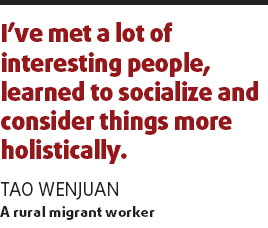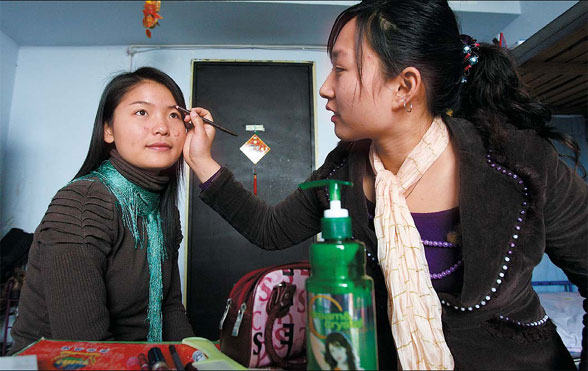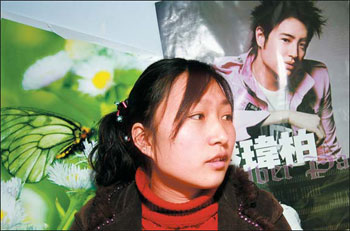In the name of respect
|
Cao Lingyan (right) and Tao Wenjuan get ready for a community performance. The young women from Anhui Province challenge city dwellers' prejudice against rural migrant workers. Photos by Li Xin |
Tao Wenjuan and Cao Lingyan are rural migrant workers on a mission. The 22-year-old women want equality and respect from China's 577 million city dwellers. As president of a women's association at a rural migrant community in Fenghua, Zhejiang Province, Tao proposed to the city council that it was time to challenge the city dwellers' prejudice against the migrant worker.
The term for rural migrant workers should be "new citizens" rather than the currently popular "alien workers" (wai lai wu gong ren yuan in Chinese), Tao says.
"Alien workers" has an outsider's feel. It constantly reminds migrant workers that they don't belong to the city, she says.
Cao Lingyan, now head of the Youth Art Department at the same community, also feels disrespected when called an "alien worker".
The exceptional courage and social awareness that enabled Tao and Cao to stand up against mainstream society also made them inspirations for a film. Two Butterflies, one of China's first films about rural migrant workers, is director Sheng Ling's screen adaptation of the girls' successful urban experiences.
To Sheng, Tao and Cao represented a new generation of rural migrant workers who are "young and spiritually driven".
Tao and Cao may have been young when they first left their homes in rural Anhui Province four years ago, but they had no grand ideologies. Back then, all they wanted was a steady income and a shot at better lives.
Their new lives began at Libang Village, an urban community in the city of Fenghua that offered inexpensive room and board for rural migrant workers.
Together with 2,800 rural migrants from more than 20 provinces across the country, Tao and Cao settled in their own corner of the city.
The girls seemed to have it made, earning more than 2,000 yuan (US$270) a month on production lines in a cell phone factory.
|
Cao Lingyan quits her work in a factory and turns to community work for personal fulfilment. |
But soon the emptiness set in. "Your environment has so much influence on your personality," Tao tells Zhejiang Online News.
"I was tired of dealing with products, I wanted to meet some people," Tao says about her stifling job.
Tao and Cao turned to community work for personal fulfillment. The community is Libang Village, where rural migrants feel like locals.
In 2003, Libang Village changed its name to Libang Compound to embrace its urban identity.
Libang also elected its own committees including a Communist Party office, a family planning committee and a women's association.
Tao and Cao jumped at the opportunity and became actively involved in committee organization.
More than 90 percent of Libang's residents are aged between 18-24 and these young workers needed a venue to socialize and unleash their youthful creativity.
After working all day, people congregated at the canteen and the many function rooms in the compound, where they could eat, chat, relax, read and watch television.
There are also specialized programs and classes, such as break dancing and table tennis for the more dedicated.
In 2005, both Tao and Cao quit their factory jobs to work full time for Libang compound. Although they made less than half of what they used to make at the factory, they felt like they were learning and improving more through their new community-based work.
"I've met a lot of interesting people, learned to socialize and consider things more holistically," says Tao about her position at Libang's women's association.
With her colleagues, Tao organizes cooking competitions, modeling classes, English tutorials and fashion seminars for women and men alike.
Twenty-year-old Libang resident Zhang Xingxing thinks of Tao as a teacher and a good friend.
"She is a highly capable modern woman," says Zhang, "very bubbly, too."
Last year, the young woman achieved a college diploma in accounting after three years of study after work. Tao is moving on to a Bachelor's degree, also in accounting. A bookworm since young, she hopes to eventually become a bookstore owner.
Both have found love in the city. This year, Cao married her boyfriend, a local of Fenghua and can now call the city her real home.
All these real-life details went into Two Butterflies. Set in Libang, the film premiered in March. A few free screenings followed at several rural migrant centers. The workers watched their own lives on the big screen.

Tao and Cao both had minor roles in the film. They found acting easy, having performed a lot in front of cameras and crowds at community get-togethers. Watching the film, Tao and Cao were sometimes moved to tears witnessing some of their tougher times depicted on screen. However, their story has a happy ending.
Every year, 18 million rural dwellers flock to China's 660 cities, contributing to the cities' economy and culture in innumerable ways.
This population shift, which marks China's urbanization, is one of the greatest and swiftest in world history.
Usually less educated and thus confined to manual labor, rural migrant workers are some of the toughest and most underpaid of China's workers and often the most misunderstood people in society.
As one character puts it in the film, "we were all farmers in the last life."
Indeed, one generation ago, everyone worked in the fields. Then, all of a sudden, China's urbanization took off with a kind of violence and vengeance against centuries of backwardness.
"This film honestly reflects the lives of modern migrant workers," says Zhang Xingxing.
"Maybe it will change some people's prejudiced opinions about us," says another to Qianjiang Evening News.
Now, the city of Fenghua is catching up on "new citizens".
Every time she hears someone use the term, Tao is filled with pride and would whisper to the next person: "Hey, that was my idea."
(China Daily 12/04/2007 page18)
















